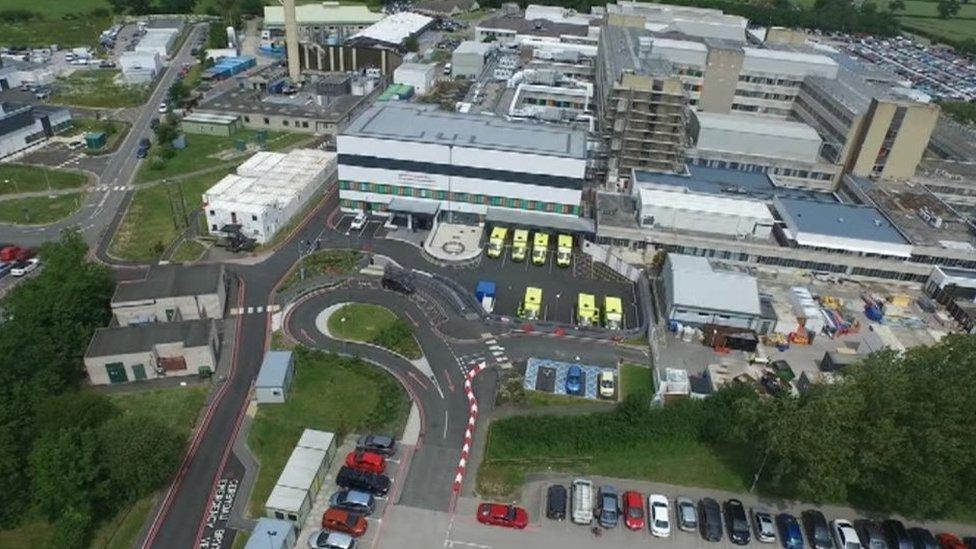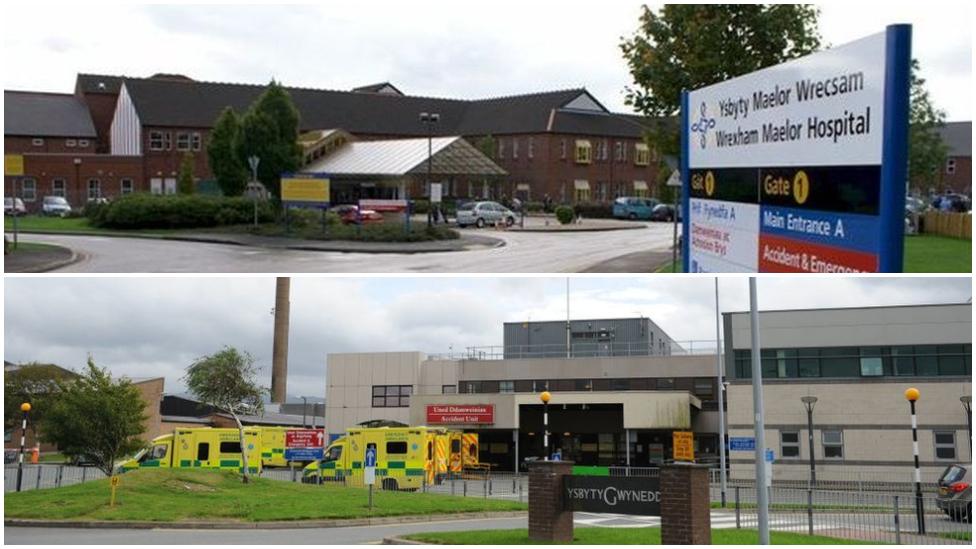Betsi Cadwaladr vascular services: Coroner not fully informed of patient deaths
- Published

Vascular services were reorganised in April 2019, with complex procedures moved to Ysbyty Glan Clwyd
A review at an under-fire health service has discovered four historical patient deaths had not been fully declared to the coroner.
They came to light during the latest review into Betsi Cadwaladr health board's controversial vascular service.
Reports were commissioned by the health board after fears were raised following the creation of a new hub at Ysbyty Glan Clwyd, Bodelwyddan, Denbighshire.
Medical director Dr Nick Lyons has apologised to patients and families.
In an interview with Newyddion S4C, he admitted it was was "a difficult read" but claimed "many of the issues have been recognised and improvements have already begun".
Vascular services, which relate to issues with the body's blood vessels, were reorganised in April 2019, with complex procedures moved to Glan Clwyd from Wrexham Maelor Hospital and Ysbyty Gwynedd in Bangor, Gwynedd.
An initial report by Royal College of Surgeons (RCS) raised nine urgent recommendations and other issues, including too many patient transfers being made to the centralised hub, a lack of vascular beds and frequent delays in transfers.
Its final report, published last February, focused on the clinical records of 44 patients dating from 2014 - five years before centralisation - to July 2021, two years after the Glan Clwyd hub opened.

Vascular services: Complex procedures were moved from Wrexham Maelor Hospital and Ysbyty Gwynedd in 2019
That critical report made another five urgent recommendations "to address patient safety risks".
At the time, Dr Lyons apologised to patients and accepted the findings unreservedly.
Ysbyty Glan Clwyd has since been placed under "targeted intervention" by the Welsh government, meaning closer oversight from Cardiff Bay, with a specific focus on vascular services.
In response to the report, Betsi Cadwaladr University Health Board (BCUHB) created a Vascular Quality Review Panel with a view to improving patient care and services.
But the latest review, published on Tuesday, is once again highly critical of elements of the vascular service, making a total of 27 recommendations across eight subject matters.
Recommendations include improving communication with patients and families, reviewing consent practices to ensure they "are consistent with the legal and regulatory framework", and ensuring staff engagement and understanding of the vascular system was in place.
It also draws attention to patients "with a high number of falls or a number of pressure ulcers... there should have been a process in place proactively recognising this and recording actions then taken with monitoring and evaluation".
But despite these criticisms, it is the revelation that four deaths have not been fully declared to the coroner which may cause most surprise, especially as the cases had already been subject of a review by the RCS.

Health board boss Dr Nick Lyons: "We now have a much more robust process"
Dr Lyons said: "There were four deaths where, on review of the notes, I was concerned that, potentially, we hadn't informed the coroner of all the details when those four patients had passed away.
"We have contacted those families to raise that concern and I have informed His Majesty's Coroner that he may want to consider some circumstances relating to those deaths."
When questioned on transparency and due process in relation to the four deaths, Dr Lyons said: "I think the fact that I'm talking to you now shows that we are very much trying to change the way we communicate with our patients, with our staff and we're open about where there is room for improvement.
"We now have a much more robust process... to ensure that we do communicate in a timely and completely open way with the coroner."
Health Minister Eluned Morgan said she did "not underestimate how challenging it has been for the health board officials to address" issued raised in the review.
But she went on to say that people in the region "must be assured" that the health board had "rectified the issues identified, improved pathways and outcomes".
- Published2 August 2022

- Published3 February 2022
